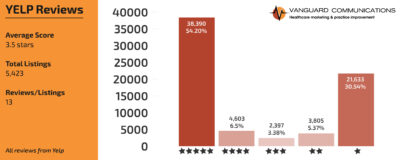
Low stars are a low blow for doctors’ online reviews
“Great reviews don’t come easily,” says researcher and Vanguard Communications Technical Director Jonathan Stanley. “Low star ratings or negative doctors’ online reviews can be the deciding factor when a patient is searching for a provider.”
Stanley analyzed more than 1.5 million reviews using the Yelp Dataset Challenge in the categories of doctors, restaurants and hotels.
“What’s really interesting is that each category – restaurants, hotels, doctors – averages a 3.5-star rating, but the paths to their scores are vastly different,” Stanley explains. Compared with restaurants, a doctor is 64% more likely to receive a 5-star review, but 194% as likely to receive a 1-star review.
Customers’ experiences with restaurants and hotels are more nuanced, he notes, averaging out location, service, quality and other factors that land these categories in the middle of the rating scale.
Doctors’ online reviews carry five times the impact
Vanguard Communications‘ research also revealed that reviews of doctors carry more weight than those for hotels or restaurants. On average, a hotel receives 61 reviews, restaurants 27 reviews, and doctors 13 reviews.
“That means each doctor review carries from two to five times the impact of a restaurant or hotel review,” Stanley says.
In other words, people’s experiences with doctors are polarized: either awful or spectacular.
“An overcooked steak or a lumpy mattress doesn’t seem nearly as tragic as a misdiagnosis catastrophe,” Stanley explains. “When the stakes are life and health, patients may find that they cannot excuse seemingly typical customer service issues, and they feel compelled to warn others.”
Great medical care is no longer enough

Ron Harman King, CEO of Vanguard Communications, notes that, in the online age, delivering excellent medical care is no longer enough for many consumers.
“Disorganization, poor communication, long wait times and other customer service complaints are the dominant rating issues for physicians today,” King says.
Patients research doctors online the way they research cars, homes or other big-ticket items. “They begin to form perceptions based on a doctor’s online reviews, the practice’s website, the phone-answering systems, and the front desk staff before ever meeting the physician,” King explains.
Vanguard’s findings indicate that doctors do not generally rate better or worse than other businesses. Rather, the severely polarizing effects of a disappointing patient experience are more dangerous to medical practices than other businesses.
The most prevalent issues in negative doctors’ online reviews include frustration and difficulty making appointments, long waiting room times, and rude front desk, billing and nursing staff.
There is good news for physicians, however. Patients are almost twice as likely to give doctors good reviews as poor ones. Prior Vanguard research of 34,748 online patient reviews found that66 percent of patients awarded 4 and 5 stars, while only 34 percent gave 1 and 2 stars.
About Vanguard Communications
Vanguard Communications has partnered with medical practices for more than 25 years to attract and engage new patients. We provide two ways to grow: through proven specialty-specific marketing and practice improvement services. Our dedication to patient motivation, creative communications, targeted online communications, and strategic reputation management help us build for our clients a culture of continuous improvement.
Media Contact: Lisa Long | 303-382-2999 | [email protected]